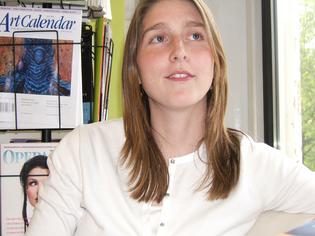 On her first night enrolled as a student in City Hall’s “Democracy School,” Kara Arsenault learned her biggest civics lesson from a fellow student, not the speakers. Follow along with her as she keeps an online diary of her weekly classes.
On her first night enrolled as a student in City Hall’s “Democracy School,” Kara Arsenault learned her biggest civics lesson from a fellow student, not the speakers. Follow along with her as she keeps an online diary of her weekly classes.
May 2, 2006
Today, for the first time in years, I was headed back to class. School, books, but hopefully no teacher’s dirty looks.
I know it’s ridiculous to be nervous, but whenever I meet new groups of people, the butterflies begin to swarm. I’m not exactly sure why. Maybe it’s because I’m horrible at small talk. Maybe it’s because I know that at some point in the evening I’ll be called on unexpectedly, my face will turn bright red, and I’ll secretly wish my Irish roots away. Or maybe it’s the thought of the dreaded “getting to know you” games.
Whatever the reason, it’s too late now. The first class is already halfway over and here I am, four strangers around me, waiting for someone else to start our first class assignment. The task seems simple enough — “introduce yourself, say one thing you like about your neighborhood and one thing you don’t. Thank god for Theodore.
“What do you guys hope to get out of this class?’ Theodore was a black man from East Rock and so far all I knew about him was that he didn’t run at the sight of free pizza and he knew the name of every street within a two-mile radius of his house.
So why had I enrolled in the class? This question had been a breeze on the application. Having moved to New Haven just six months ago, I wanted to find out more about the people and policies that made the Elm City tick. And then there was my dad. He’d been a town councilman in my tiny upstate New York home for as long as I can remember, and I wanted to make him proud. Next time we talked on the phone, I’d make sure to debate the merits of hometown politics.
And so far tonight, I’d learned a lot about my new city. I learned that many folks in my class of 48 had lived in New Haven almost their entire lives. I witnessed firsthand Mayor DeStefano’s smooth campaigning skills — “the old “use the person’s name like you know them even though you secretly just glanced at their nametag” trick. I discovered that it’s hard to passionately explain the intricacies of a town committee to a crowd that’s just worked till 5 and still hasn’t eaten dinner. I discovered that Democrats outnumber republicans in New Haven 8 to 1.
I found out that the city lawyer is actually appointed by the mayor and that even he doesn’t like having to disagree with his boss. I discovered that everyday folks can get awfully fired up about sidewalks. And I found out that now, even years out of school, my stomach still churns at the mention of the word “homework.”
But it was Theodore who taught me the most last night. Sure, I could recite all the right reasons for wanting to attend democracy school. But those were just words. For Theodore, Democracy School was a passion. He was coordinator, secretary and recruiter of his neighborhood block watch. He gave talks to kids at school about the importance of community involvement. He actually knew the name of several people in City Hall. “You’ve got no right to complain if you don’t try and get involved.” I’d already heard that phrase a million times tonight — “from the mayor, my teacher, even the Democratic chair. But I hadn’t really felt it until I met Theodore.
And he’s right. Too many times, I’ve just let the world happen to me. I wish I’d sat and chatted with professors more during office hours at college. I wish I’d contributed more story ideas to staff meetings when I worked at NPR. I wish I’d actually brushed aside my fears and finally learned how to drive stick.
Democracy school’s no different. I’m not really going to learn unless I raise my hand and ask questions. I won’t really understand Board of Aldermen President Carl Goldfield unless I take the time to walk up and shake his hand. School won’t really matter unless I actually call a few of the numbers given out on the business cards.
But small steps first. Tonight let’s just see if I can go home and get through all the handouts—